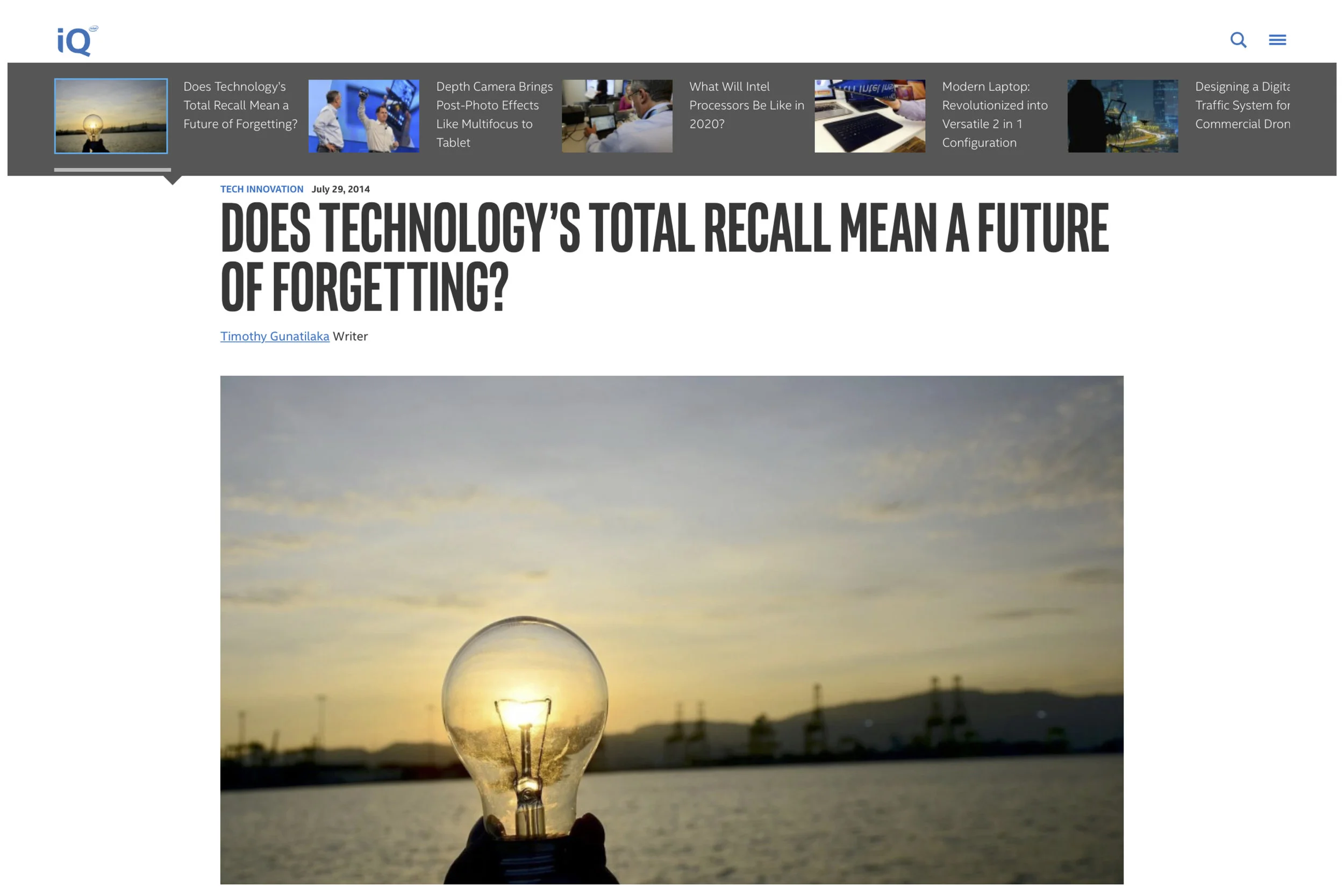iQ BY INTEL
Article Sample
Advances in social media, as well as tablets, mobile and wearable tech, now empower us to instantaneously post and preserve every moment of our lives.
But as our machines get smarter, devices get smaller, the ability to record every sensation and experience becomes increasingly seamless and the cloud impacts every facet of our lives, what becomes of human memory?
Today, there are over 1 billion gigabytes of information stored in the cloud. Today, 400 million photos will be uploaded to Facebook and Instagram. Today, 500 million tweets will be shared on Twitter, and there will be 6 million check-ins on Foursquare.
Wikipedia houses more than 4.5 million articles in English, while an entire library of information is instantly available via a quick Google search. As a result, we now have access to a universal reservoir of facts, sensations and memories — what futurist-filmmaker Jason Silva calls “our global brain.”
As much as the Internet flattens the world and connects us virtually regardless of physical distance, digital forces are similarly flattening knowledge and expanding the reach of information.
“The same way we think through our repository of knowledge in our brain by trying to think of something, we’ll be able to think of a query and immediately get it from Google,” Silva told iQ. “The symbiosis is completed. There won’t even be a difference between whether the facts are stored on Google in the cloud or stored in our physical brain.”
Being able to conjure up any fact or memory from the cloud with a click — the name of that quaint café you visited on your last vacation, a short story you loved from Comp Lit class, an old memo from your boss, life’s most precious and not-so-precious moments — provides a powerful set of new tools.
“They’re mental prosthetics. They’re ways to extend our thinking beyond the brain,” said Silva.
On the other hand, could these changes lead to a future of forgetting everything? Will computer and cloud memory completely replace the need for human memory?
“Since the early days of humankind, we have tried to remember, to preserve our knowledge, to hold on to our memories, and we have devised numerous devices and mechanisms to aid us,” Oxford professor and author of Delete: The Virtue of Forgetting in the Digital Age, Viktor Mayer-Schönberger writes. “Yet through millennia, forgetting has remained just a bit easier and cheaper than remembering.”
Mayer-Schönberger, Silva and other cyber-thinkers actually see many benefits to forgetting as a result of the total recall enabled by the Internet. For them, it’s not so much that computer memory wholly erases the need for human memory, but rather optimizes the role of memory in our lives.
Polish author Piotr Czerski writes, “The Web is a sort of shared external memory. We do not have to remember unnecessary details: dates, sums, formulas, clauses, street names, detailed definitions. It is enough for us to have an abstract, the essence that is needed to process the information and relate it to others. Should we need the details, we can look them up within seconds.”
Such capabilities allow us to ignore more marginal matters (because we can always dig them up later) in favor of concentrating only on those subjects we find most salient.
“By discarding most of the avalanche of details that our senses are bombarded with every day, as well as past wounds, our brain helps us focus on the important things; it lets us see the forest rather than just the trees,” Mayer-Schönberger writes in the Washington Post. “Forgetting is fundamental to how we make sense of the world. Forgetting helps us survive, by making sure we don’t dwell in the past.”
In the same article, Mayer-Schönberger alludes to “Funes the Memorious” by Jorge Luis Borges. In the Argentine writer’s story, the titular character falls off a horse and somehow acquires the ability to perceive and remember everything. The simple act of observing a cloud, for example, becomes an overwhelming experience of “muscular sensations, thermal sensations” and countless minute details.
The torrent of Funes’s unique cloud memories results in unfortunate consequences: “He was not very capable of thought,” Borges writes. “To think is to forget a difference, to generalize, to abstract. In the overly replete world of Funes there were nothing but details.”
According to Borges, by knowing and feeling and remembering everything, he actually understands nothing about the world or himself.
Similarly, technology’s total recall pushes us to embrace “curiosity instead of just memorizing things for basic survival purposes,” Silva noted, allowing us to transcend our more primitive selves who would simply “learn from our mistakes and avoid threats.”
Knowing we can access all the minutiae from our lives and the world around us lets us focus on and remember only what is most “valuable to us and that we’re passionate about,” Silva said.
Thanks to technology, we only hold on to those moments that help define who we are. Or as Silva simply surmised: “Memory is my story.”
Images courtesy of Intel and Tiago Gerken/Unsplash
